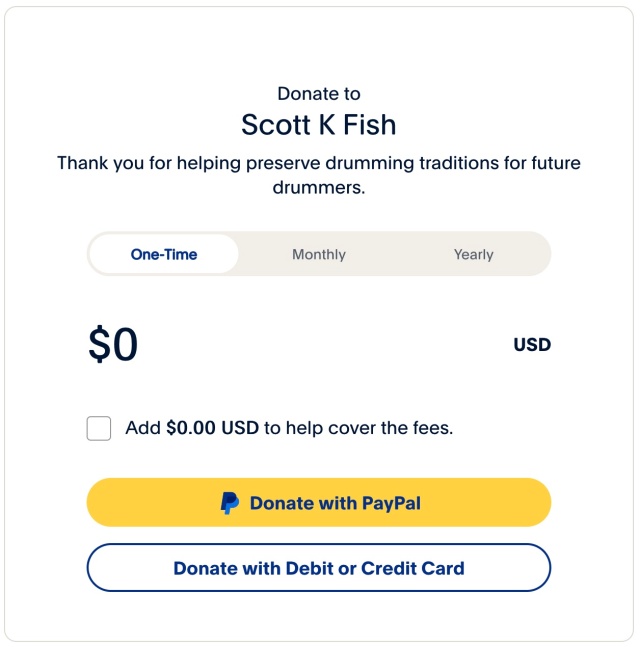In my career I’ve written album reviews and drum equipment reviews. I don’t like doing it. Both types of reviewing rely on written words to describe sounds that change, listener to listener.
I’m imagining sitting in an theater seat. Onstage is a standard five-piece Gretsch drumset: 20-inch bass drum, 8×12 and 9×13 rack toms, a 16×16 floor tom. It includes all Sabian cymbals: 20″ Ride, 18″ Ride/Crash, and 14″ Hi-Hats. All drums are double-headed with Remo coated Ambassador drumheads.
Tommy Lee walks onstage, sits down at the Gretsch drumset and says, “I’ll play these drums and cymbals so you can hear what they sound like.” And he does.
When Tommy Lee finishes, Brian Blade sits down at the Gretsch drumset. He says, “I’ll play so you can hear what these drums and cymbals sound like.” And he does.
Do these Gretsch drums and Sabian cymbals sound the same when played by Lee and Blade? Suppose my style is closer to Brian Blade, and only Tommy Lee shows up to play so I can hear what these drums and cymbals sound like?
How drums, cymbals, and all drum gear sounds and functions is, from where I sit, totally subjective. And in my example I’m using out of the box equipment. Add to that the almost limitless personal sound touches drummers add to their gear: tape, cotton, foam rubber, car keys, tuning, drum heads, on and on.
I have friends who excel in writing drum gear reviews. T. Bruce Wittet, Chip Stern, and Bob Saydlowski are three. But I have neither their aptitude nor enthusiasm for it. Caveat: I love and appreciate well-made, great sounding drum gear. My challenge is translating my love and appreciation using words.
My aversion to album reviews is easier to explain and clarify. I can write, in brief, about albums I like. No sweat. But writing negative album reviews? I am unable to shake the axiom: If you don’t have something nice to say, don’t say anything.
Here again, music is subjective. My musical tastes are changing all the time. It took me awhile to appreciate John Coltrane‘s Ascension. At first, I didn’t like it at all. But I loved Coltrane’s earlier work and his work with Miles Davis, Thelonious Monk, and Red Garland. My introduction to Coltrane — and to Elvin Jones — was Coltrane’s Africa/Brass album.
I took a methodical approach to Coltrane’s later works. Coltrane was a music master who played brilliant, unique mainstream jazz. Unlike other avant garde players, I never questioned Coltrane’s mastery of music. So, I wondered, how did the John Coltrane playing Monk’s Mood with Thelonious Monk at Carnegie Hall evolve to John Coltrane playing One Down, One Up at the Half Note?
I listened chronologically, to almost the entire Coltrane discography, and I read as much as I could find about Coltrane’s evolution. And I’m not finished with Coltrane. I am still wrestling with his band with Rashied Ali on drums and Alice Coltrane on piano. Stay tuned.
I follow that same process with most music and musicians. Sometimes I hear a musician play one song and I’m sold for life. That happened to me with singer songwriter Guy Clark after hearing him perform, Desperados Waiting for a Train. Other times, it takes awhile before I understand music. And there is plenty of music I just don’t like.
All that’s a roundabout way of explaining my aversion to writing album reviews. I understand what it means to be a musician trying to earn a living. There’s no point in my publishing a bad review of an album someone else loves, that I may love another day.
— end —

